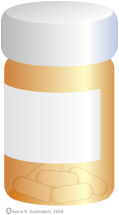From Health Notes:
|
Many supplements interact with anticoagulants. These reactions may make the medications less effective or may increase the risk of bleeding. This post has links to places where you can get information on drug/natural supplement interactions. Make sure to check for interactions, talk to your pharmacist, and talk with your doctor before adding or removing supplements from your treatment plan. This will help you prepare for possible problems. From Health Notes: Other reliable references:
3 Comments
Student teaching is over and I am finally getting back to this website. I want to start by taking a moment to welcome all of the new Clot Spot readers. Today I want to talk about a new article that was just added to The Clot Spot. Today I wrote a lengthy post on natural alternatives to warfarin. It can be found here. I wrote this article because this is something that feel very strongly about. I use natural medicine for my migraines under supervision of my doctor. The supplements were carefully chosen and well researched. I take them, not because I am afraid of pharmaceutical preventatives, but because those preventatives simply did not work for me. Before I started taking them, I did a lot of research. I wanted to know what side effects might occur due to these supplements. After understanding my risks, I started the supplements.
I strongly encourage all of you to do this research for both pharmaceutical and natural treatments. Some natural treatments are more harmful than you can imagine. There are no requirements for supplement companies to run a disclaimer on their ads or their bottles. These companies even try to market supplements as a "drug free" alternative. Natural supplements are drugs. They have side effects. I have chosen not to use supplements that will change how my blood clots. Some of you may choose a different path. I do not trust my blood to unregulated supplements. Many of us struggle with different brands of warfarin and those variations are less than 4%! If 4% bothers your body, imagine what an unregulated variation may do to your body. Bleeding and clotting are important. I want to know how much of a substance is in me. Those natural supplements are chemicals and I want to have them carefully controlled. I do not want to bleed to death or clot due to variations in dosage. Also, I want a medication that is well tested. Recently, I read an interesting article on this topic at Slate. I highly recommend it. It got me thinking a lot about our fear of "chemicals" and "drugs". With that article and my recent addition to The Clot Spot, I want to play a guessing game. I will describe three common substances that can be used to prevent clots; you will guess what they are. Please leave your guesses in the comments. Ready? Substance #1: This substance was discovered when a farmer noticed his cows were bleeding more than a healthy cow should bleed. He did some research and found out that the cows had consumed a large amount of a certain plant while munching the grass in their pasture. This natural substance is very effective at preventing clots and is still used for this purpose to this day. Substance #2 This substance is fine when taken in certain amounts. It is very effective in preventing clots and often recommended by doctors. If the patient takes too much of this substance he or she will suffer muscle contractions, headache, seizures, nausea, and unresponsiveness. If this overdose is not addressed, it will lead to coma and death. Substance #3 This substance is starting to show promise as a means to prevent pulmonary embolism. Although the research is conflicting, some doctors are recommending that patients use this substance. This substance increases the risk of fatal bleeding. Other side effects of this substance include vomiting, stomach pain, hives, rash, facial swelling, difficulty breathing, fast heart rate, fast breathing, clammy skin, loss of hearing, and death. I will be back on to share the answers in a few days.  Pill Bottle This week, doctors have shared another risk factor for pulmonary embolisms, DVTs, and other types of venous thrombosis. The good news is that we now have another risk factor that we can avoid. The bad news is that the risk factor is a critical treatment for many patients. Glucosteroids, one of which is cortisone, have been found to increase the risk of having a venous blood clot by two to three times. Even more problematic is that the form of the steroid doesn't matter. Inhaled, injected, or swallowed, all glucosteroids increase the risk of a clot (although some forms are more risky than other forms). Doctors are already cautious about using glucosteroids due to their lengthly list of frequent, serious side effects. This caution should continue. The risk of clots is the highest after beginning a new steroid regimen. The risk continues throughout the steroid use and then for at least a year after the steroid is discontinued. The important thing to learn from this study is that every patient needs to discuss this risk with his or her doctor. It would be a good idea to discuss the risk of the steroid, other risks that the patient has, and possible ways to lower the risk of clotting. To read more about the study see http://ow.ly/jYWTF Picture By Kevin Dufendach [CC-BY-3.0)], via Wikimedia Commons It is common knowledge that certain prescription medications are very expensive. This is especially true if it is a newer medication or if it doesn't have a generic form. This doesn't mean that generics are always easy on the pocket book. Generics can run high as well. So, how can you find good prices on medications? What are your options?
Here are some other interesting thoughts on prescriptions for pulmonary embolism treatment for you. Some people will find certain brands of a generic medication to work better for them. If this is the case, your doctor can specify on your prescription to ONLY give you a certain brand or to give you any generic BUT a certain brand. I do that with my Wellbutrin generic. It was much easier ad cheaper than fighting to use name brand Wellbutrin. The brands are listed on your prescription bottle or you can often look up a pill online using a search engine and the pill's label, number, color, or markings. If you need brand name Coumadin or you need another medication like one of the newer anticoagulants and your insurance won't pay, first have your doctor's insurance representative call to ask for an override based on medical need. If that doesn't work, ask your insurer for the address of the appeals department and write the letter. Your doctor can help you to make sure you have a solid, well informed letter. |
Archives
July 2016
Categories
All
|

 RSS Feed
RSS Feed

